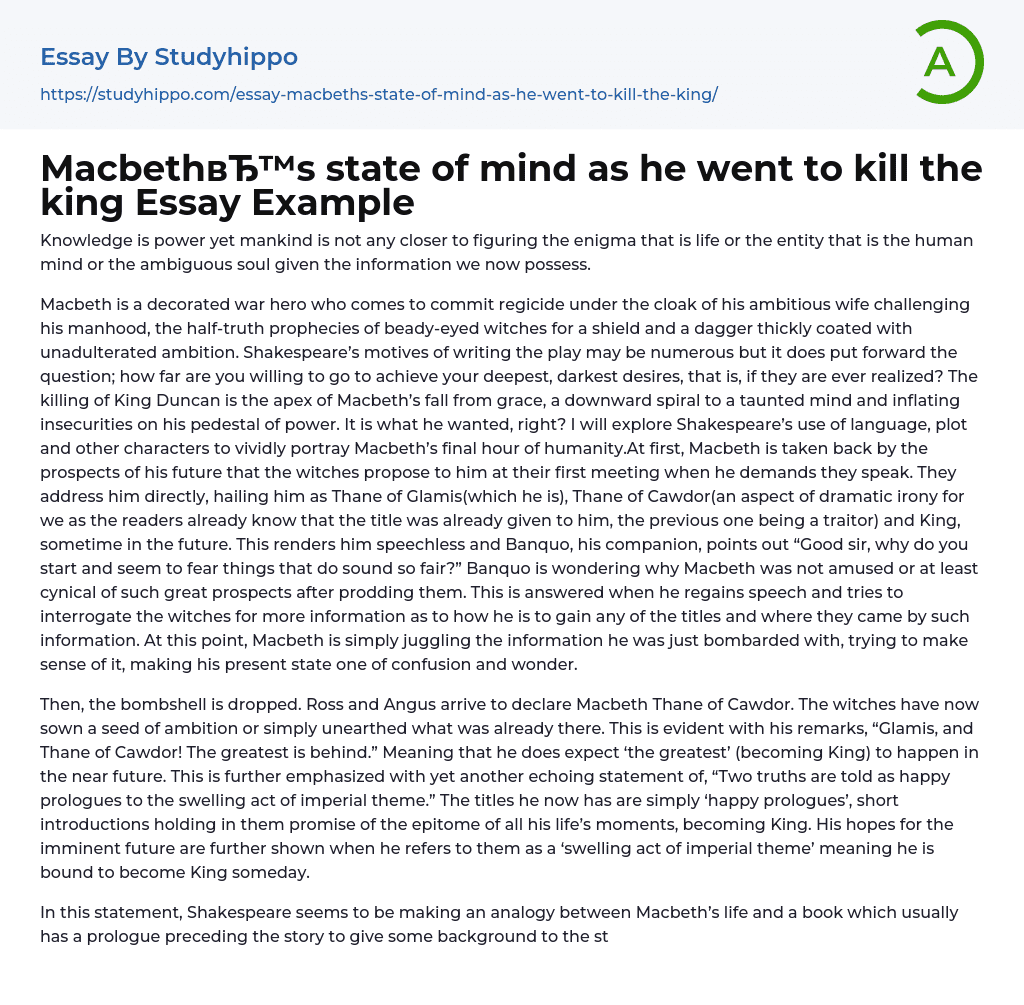

Macbeth’s state of mind as he went to kill the king Essay Example
Despite the knowledge we possess, humanity is still far from unraveling the mysteries of life, the human mind, or the enigmatic soul.
Macbeth, a decorated war hero, is driven to commit regicide by his ambitious wife and the deceptive prophecies of witches. Shakespeare explores the depths people are willing to go to achieve their desires in this play. The killing of King Duncan marks Macbeth's descent into madness and insecurity. Despite initially being taken aback by the witches' prophecies, Macbeth becomes consumed by his newfound power. Banquo questions Macbeth's reaction to the prophecies, wondering why he is not skeptical or amused by the possibilities they present.When Macbeth regains his speech, he attempts to question the witches about how he can achieve the titles and where they obtained their knowledge. In this moment, Macbeth is overwhelmed by the
...sudden influx of information, striving to comprehend it all, resulting in his current state of confusion and amazement.
Then, comes a revelation. Ross and Angus arrive to announce that Macbeth will be Thane of Cawdor. The witches have either awakened his existing ambition or planted a new seed of it. This is evident through his words, "Glamis, and Thane of Cawdor! The greatest is behind." This indicates that he anticipates the fulfillment of his ultimate desire, to become King, in the near future. He reinforces this anticipation with another similar statement, "Two truths are told as happy prologues to the swelling act of imperial theme." The titles he currently holds are merely "happy prologues," brief introductions that hold the promise of his life's defining moment: becoming King. His aspirations for the immediate future are further highlighted when he refers to
them as a "swelling act of imperial theme," suggesting that he is destined to become King someday.
In this statement, Shakespeare likens Macbeth's life to a book with a prologue that provides background or foreshadows events. This shows Macbeth's anticipation of enjoying rewards without effort, increasing his desire. However, reality interrupts his imagination. He becomes confused by unsettling thoughts, asking why he is yielding to the supernatural solicitation that horrifies him and disturbs his physical reactions. He realizes the abominable act he may have to commit to achieve his goal. The unnatural state of his body, such as goosebumps and an erratic heartbeat, indicates anxiety or fear. This abnormal state is further exemplified by his thoughts, which immobilize him. He decides that if fate intends to crown him king, it will happen without his intervention. However, everything changes when Malcolm, the King's son, is announced as the future ruler.
The protagonist initially considers leaving his actions to chance but ultimately resumes his previous thoughts. These thoughts are reiterated during his soliloquy and while planning Duncan's murder with his wife, as he weighs his options. He acknowledges Duncan's exceptional rule and humble nature, yet recognizes his own driving force as "vaulting ambition" to commit the crime. He implores the stars to hide their brightness, symbolically representing his desire for secrecy. The wife further questions his masculinity by suggesting that carrying out the act would make him more of a man. She compares him to a cat in an adage, illustrating cowardice in wanting the reward without any costs. This assault on his manhood ultimately propels him to assassinate Duncan.
Macbeth's need to validate himself, either personally or to Lady
Macbeth, in defiance of his better sense, leads him to temporarily overlook the character and repercussions of his actions and aspirations. This is perceived as the supreme exploitation of opportunity. Shakespeare skillfully portrays Macbeth's pivotal moment through his creative manipulation of language, narrative structure, and the impact from other characters. The witches plant the seed, Macbeth harbors the ambition, Malcolm's impending reign propels him further into action while Lady Macbeth stokes the flames until there's no turning back. Shakespeare implies that both supernatural entities and human factors are required for a sin or malevolent act to take place. This prompts us to ask: Is only Macbeth accountable for Duncan's demise? If yes, does it suggest humans are naturally wicked or could it be due to societal or cultural influences? Moreover, if these influences can be taught rather than ingrained, what defines whether an act is good or evil? Does it depend on anticipated outcome or faced consequences?
- Banquo essays
- Macbeth Ambition essays
- A Doll's House essays
- A Midsummer Night's Dream essays
- A raisin in the sun essays
- A Streetcar Named Desire essays
- An Inspector Calls essays
- Death of a salesman essays
- Everyman essays
- Fences essays
- Hamlet essays
- Hedda Gabler essays
- Iago essays
- King Lear essays
- Macbeth essays
- Much ado about nothing essays
- Oedipus Rex essays
- Oedipus The King essays
- Othello essays
- Pygmalion essays
- Romeo And Juliet essays
- Tartuffe essays
- The glass menagerie essays
- The Importance of Being Earnest essays
- The Merchant Of Venice essays
- The Taming of The Shrew essays
- Twelfth Night essays
- Waiting For Godot essays
- Absolutism essays
- Appeal essays
- Bourgeoisie essays
- Contras essays
- Corporate Governance essays
- Corruption essays
- Democracy essays
- Democratic Party essays
- Developed Country essays
- Dictatorship essays
- Elections essays
- European Union essays
- Federalism essays
- Foreign essays
- Foreign policy essays
- Gentrification essays
- Hillary Clinton essays
- Income Tax essays
- International Relations essays
- John Marshall essays
- John Stuart Mill essays
- Left-Wing Politics essays



